How Ally Pankiw and Rachel Sennott Created a Radical Dramedy About Women’s Trauma With ‘I Used to Be Funny’
The filmmaker and actress open up about their new film, which follows a stand-up comic's search for a missing girl.
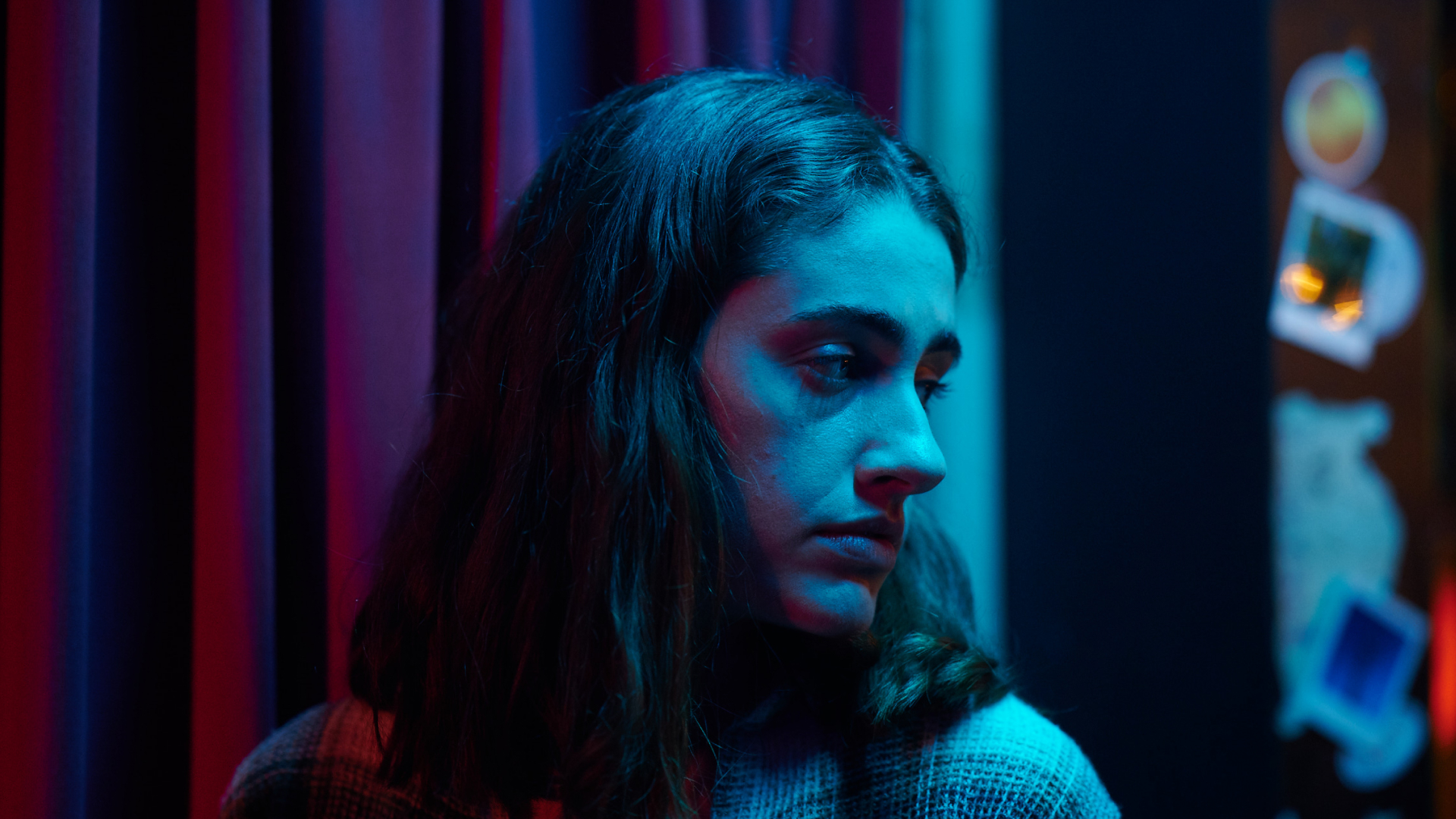
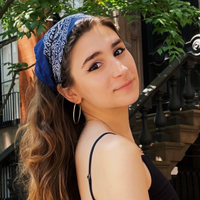
Content warning: The following article includes references to sexual assault.
Ally Pankiw thinks that sometimes the most tragic thing of all can be losing your sense of humor. It's something the filmmaker explores in her feature debut, I Used to Be Funny, which highlights quiet, nuanced depictions of how women process pain.
The film, which is in theaters in New York and L.A. and releases on digital on June 18, stars Rachel Sennott as Sam, a stand-up comic who is coping with the aftermath of a sexual assault. Before the assault, Sam was the nanny to 12-year-old Brooke (Olga Petsa) and eventually needs to muster the strength to go looking for Brooke after she goes missing. Pankiw conceived the idea for the film 10 years ago, wanting to explore how women face violence in a way that feels true to life and also highlight the “secret language” women use “to talk to each other about these things and get through things.” But it wasn’t until the 2020 release of Michaela Cole’s HBO hit miniseries I May Destroy You that she says that Hollywood execs greenlit the project, finally understanding the balance of comedy and drama she was aiming for with her own project.
Pankiw was looking for a lead with actual stand-up experience, and by the time I Used to Be Funny entered production in 2021, comedian/actress Sennott was coming off the release of indie hit Shiva Baby. Sennott was thrilled to come on board. “I thought her writing was really powerful,” Sennott tells Marie Claire. “Something she talked about was [how] you can’t ever encapsulate everyone’s experience … Hopefully there are people who can connect with it and feel seen by it, but I think the way she went about writing it was super smart.”
Here, Pankiw and Sennott discuss the film’s themes, depictions of women’s stories in Hollywood, diversifying the film industry, and more.
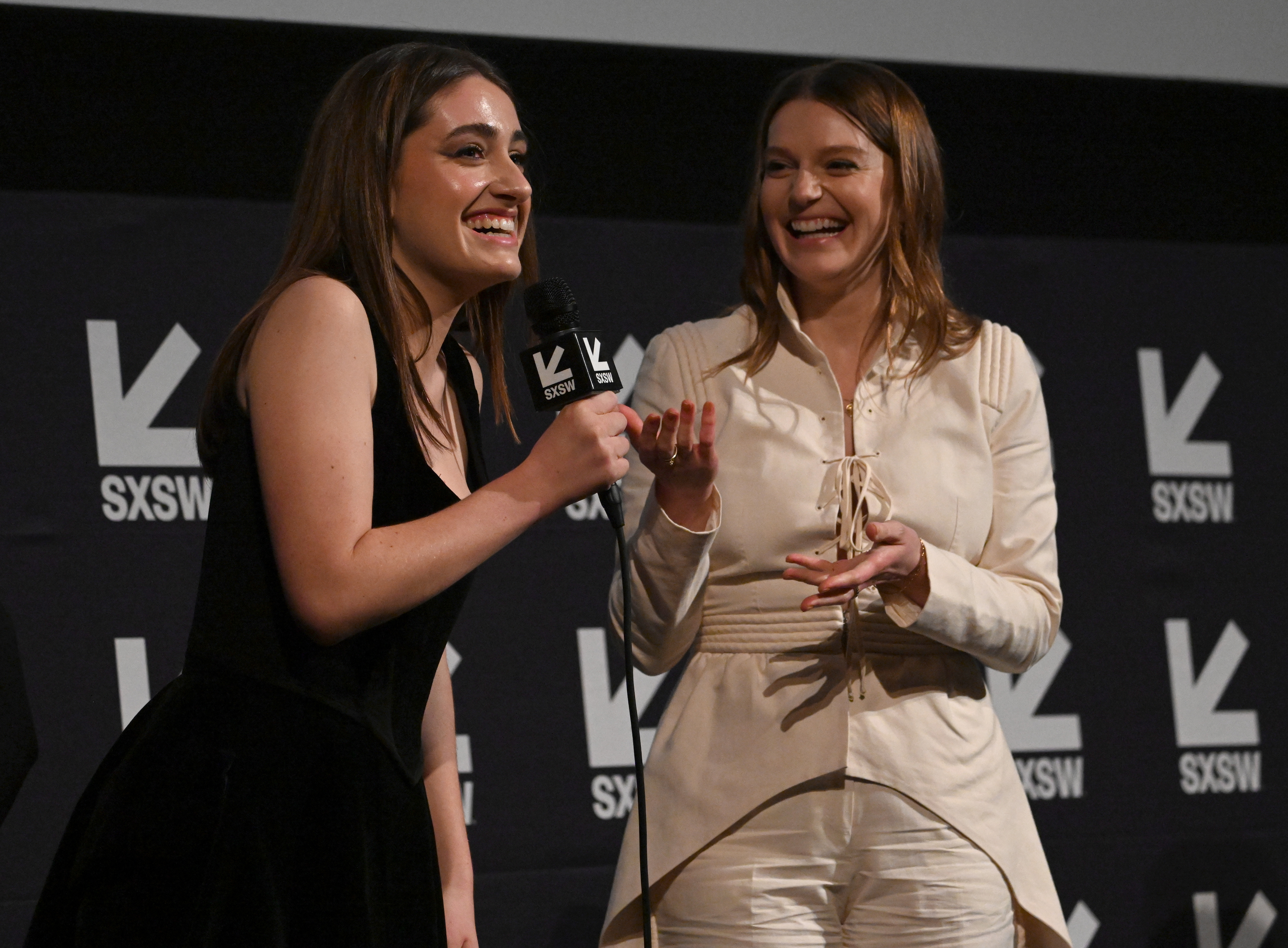
Rachel Sennott and Ally Pankiw speak at an 'I Used to Be Funny' screening at SXSW on March 2023.
Marie Claire: I Used to Be Funny marks a dramatic turn for Rachel, and I imagine you two had a big partnership in this project, given its subject matter. How did you come to work with her and develop a close relationship?
Ally Pankiw: We had known each other through stand-up scenes, and I had been a fan of her stand-up for a while. I saw Shiva Baby during the pandemic, and was like, “Oh, damn, she can act.” She auditioned for something else I was attached to around that time and I remember we did a callback session. Right after that, we realized wWe can make I Used to Be Funny, and I was like, “I think we should offer it to Rachel. She's everything we wanted.”
Get exclusive access to fashion and beauty trends, hot-off-the-press celebrity news, and more.
[I] wanted someone who was actually in stand-up but also had this pathos and dramatic ability, and she was firing on all cylinders. So we offered it to her, sent her the script, and the next day she was like, “I loved it.” We hopped on a Zoom, spoke for a few hours, and felt immediately connected over the themes and what a unique nightmare it is to be a young woman in the world, especially in this industry. We were immediately both emotional on that Zoom but also laughing.
It was exciting to bring out new elements of the character based on who Rachel is, too. When I wrote the character, [she was] a bit harder in my imagination, but Rachel is so sweet and it just bursts out of her. So that became such an important element to this character.
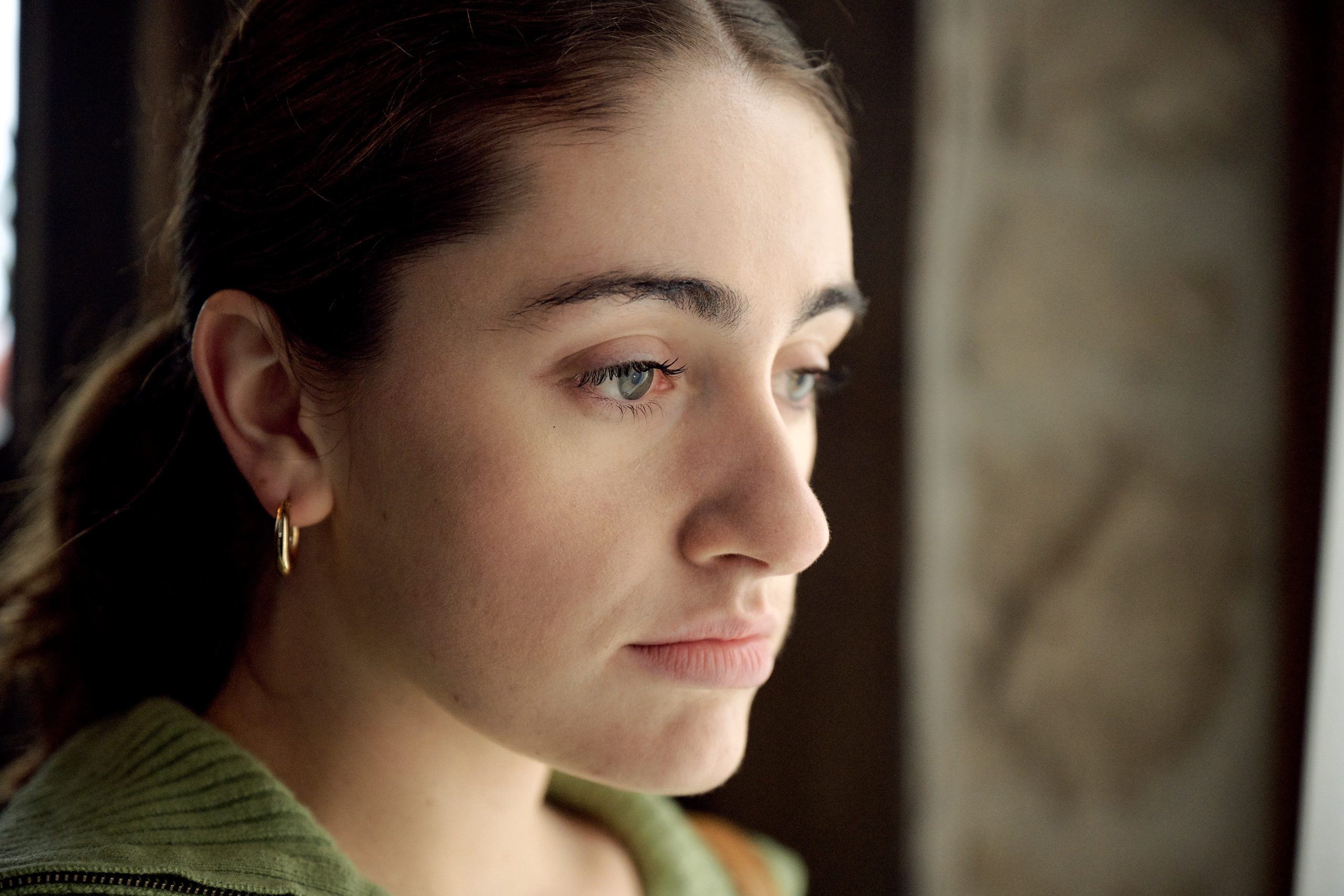
Rachel Sennott, as Sam, looks pensive during a scene from the film.
MC: Rachel, what drew you to work with Ally and the project?
Rachel Sennott: I thought it was a beautiful script about a difficult subject matter and Ally wrote about it in a nuanced way, which is hard to do. It’s easy to make something like that feel black-and-white and like you have to put everything in there heavy-handed.
When I read the script, I wasn't thinking about it in terms of drama or comedy. I was just drawn to it. I always like a little comedy because I like to laugh and sometimes drama is funny. But I definitely would love to do more dramatic things in the future. I always try to push myself and find something that challenges me in a different way than the things I've done in the past.
MC: Rachel, did you see yourself in Sam’s experience as a stand-up comedian? You used to do similar material about your experiences in dating and with men, which she gets ridiculed for by men in the film.
RS: I definitely can relate to the experience of people watching a video of your stand-up [set] out on the phone [in front of you, like what happens to Sam in one scene in the film], and it’s excruciating. I was a little nervous because stand-up is so much of how it feels in the room and the live element. So I was nervous to film the stand-up sequences because you want to get that feeling, and you don't want it to feel tired, but you're going to do it over and over because you're shooting a movie, and you need to get the shot right. But Ally was so great. She let me work on the material with her. We tried it out at the comedy bar before we shot, and that helped it feel natural and fun.
The reason I wanted to make it was because healing and recovery, to me, has never been linked to rage or retribution.
Ally Pankiw
MC: I Used to Be Funny is a muted approach to how women face trauma and comes at a time when exploring “feminine rage” has become somewhat of a trend. Do you think you’ve seen a shift in the way stories around women’s trauma have evolved in the time since you first set out to make this movie a decade ago?
AP: Yes and no. The reason I wanted to make it was because healing and recovery, to me, has never been linked to rage or retribution. All I saw was women were allowed to be incredibly fucking angry and go on a revenge streak, or they were allowed to be completely devastated and cease to exist. It felt like the middle ground—the gray area of what recovery actually looks like—was not being explored. I've seen a little more in that vein over the last 10 years. But I think then when the #MeToo reckoning happened, a lot more of those revenge narratives came out, or even justice narratives like, “We can fix this through justice.”
I think the great loss for us societally, communally, and just as women, is we lose so much joy, humor, life, and contribution from the women who are suffering from this kind of violence and trauma. That doesn't come back because someone got revenge or someone went to jail. To me, that area of loss was a really important thing to look at.
The reality of how young women get through these things and talk to each other about these things is a lot more normal than most people want to acknowledge. So [I Used to Be Funny is] a look at a normal life, and the ripple effects of when that life is affected in this way.
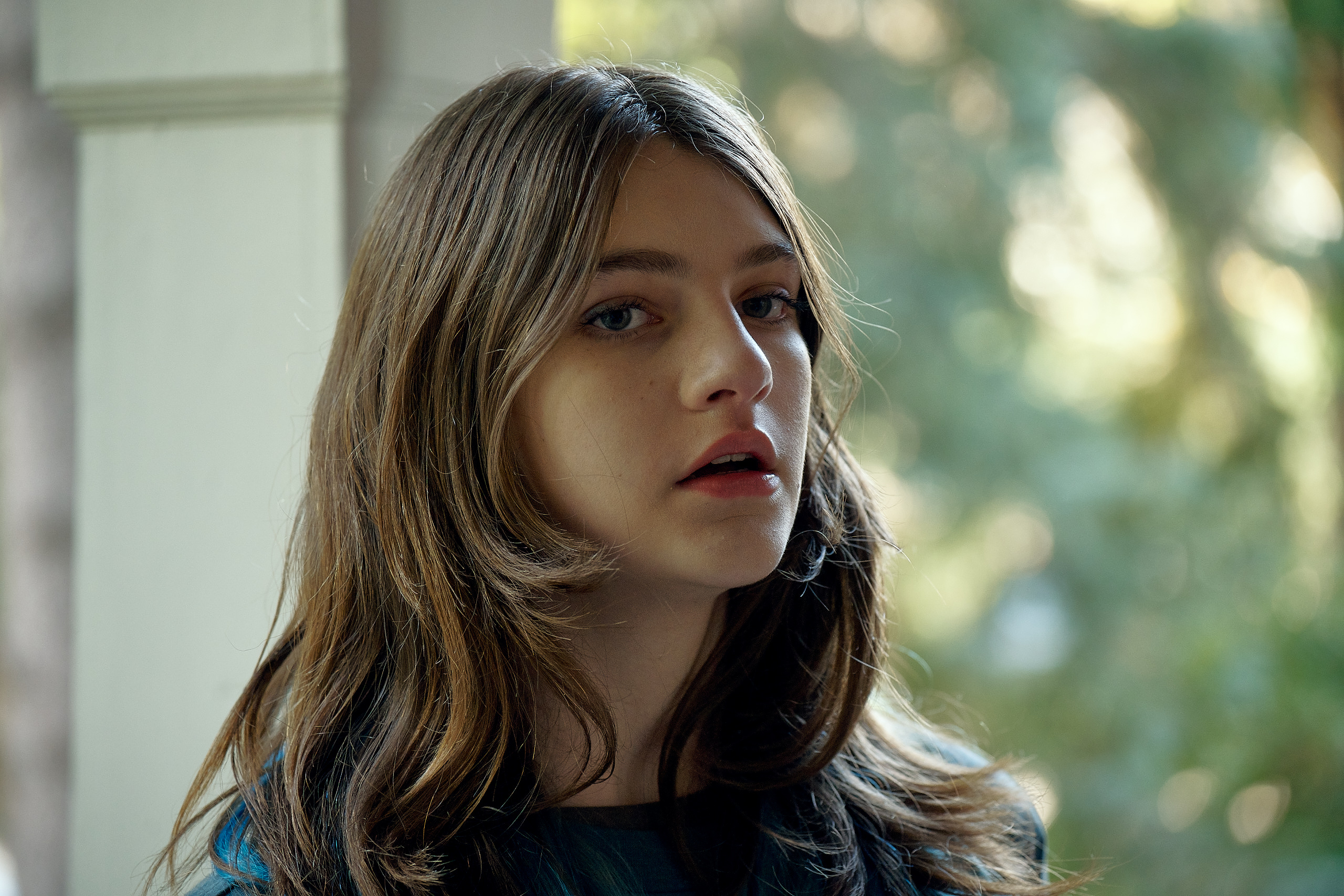
Olga Petsa as Brooke, the 12-year-old girl whom Sam nannies.
MC: A large focus of I Used to Be Funny is the intergenerational relationship between Sam and Brooke. Was that always at the core of this story?
AP: That's somatically one of the most important parts of it. It is a metaphor for inherited grief and trauma and the ways in which young women are expected to take care of other young women, which is a beautiful thing. But it's also this unfair aspect of life that we have to take care of each other. And another thing I’ve always found interesting [is how] women will rarely remove themselves from a dangerous situation if it's just for themselves. I always wanted to explore that.
MC: You see that in the scene after Sam has been raped, but instead of leaving, she goes upstairs to check on Brooke and comes up with an excuse so they can leave together.
AP: She could have left, and climbing that staircase was very difficult for her. But that's the thing, too: I wanted the film to feel like climbing a staircase is one of the most important things you'll do. For that character, it was in that moment.
I keep Sam very still and passive for a long time, so when she finally does do something active—which in the grand scheme of movies, driving to a place and getting a teenage girl to come home with you is not the biggest action sequence—but I think it feels so active because she's been so frozen in her trauma up until that point in the film. I wanted to talk about how brave little things can be when something like this has been taken away from you.
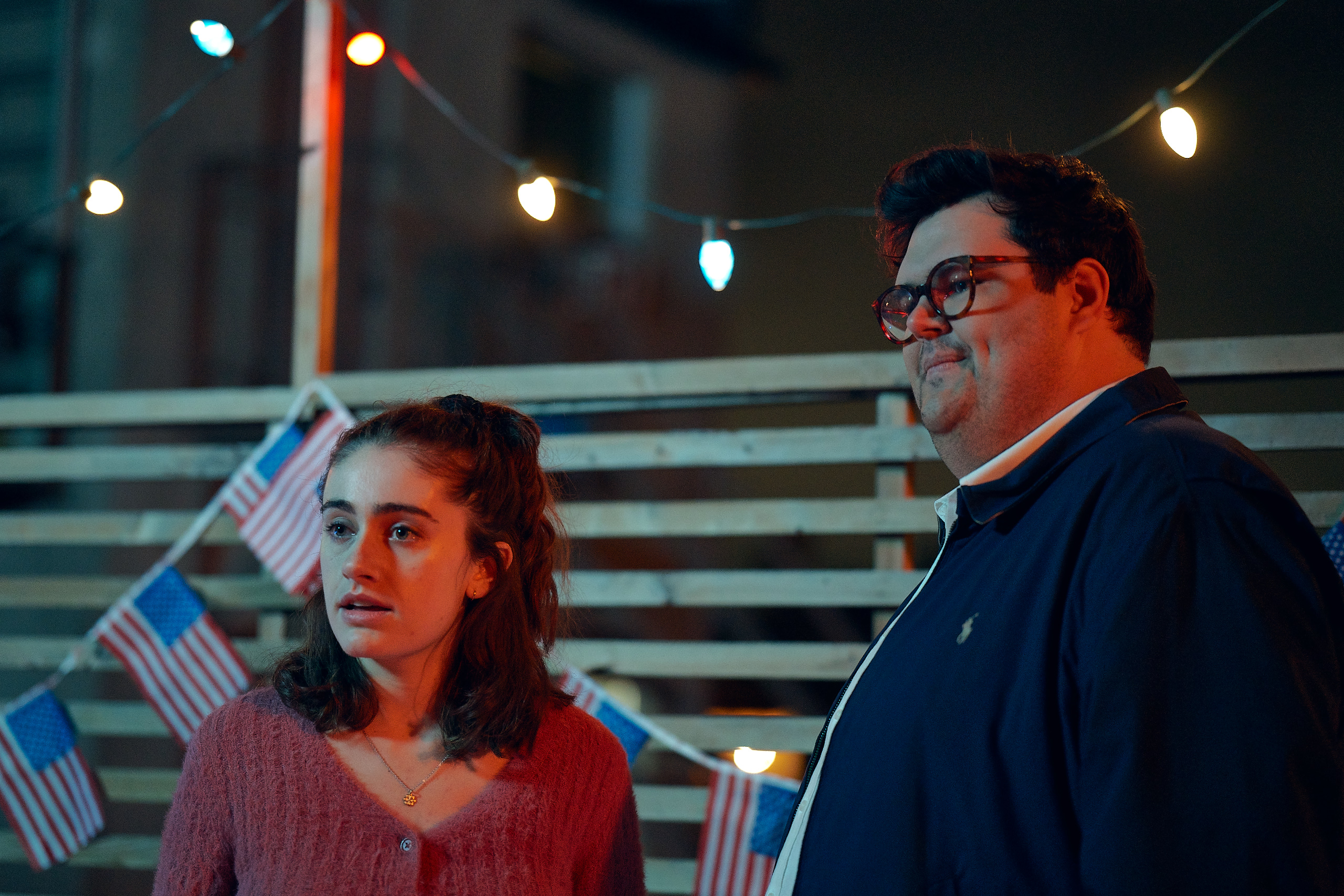
Caleb Hearon as Sam's friend, Philip, pictured here during a party scene.
MC: You shot in just a couple of weeks. What was it like balancing the film’s comedic and dramatic tone on set?
AP: The fact that it is quite a sad film, having all those funny people on set kept things moving and funny and possible. Sabrina [Jalees] and Caleb [Hearon, who play Sam’s friends] were very funny to have around because they didn't have as heavy a lift as Rachel. A lot of the time, Rachel would be preparing for a heavy scene and trying to stay in it, and then Sabrina and Caleb would come in clowning for the extras.
Getting to shoot the stand-up scenes was a favorite [memory] because those people were in their element and our extras were all people that were fans of some of those comedians in the audience getting to watch.
RS: I had so much fun doing scenes [with Caleb and Sabrina] because they're so funny and they improv and make me die laughing. The scene of us eating pasta was such a fun day because they were cracking me up. In a movie like this because you have the hard scenes, you really, really appreciate the comedy and fun scenes.
I wanted to talk about how brave little things can be when something like this has been taken away from you.
Ally Pankiw
AP: There were definitely hard days, especially when we were shooting what we called within the crew “the bad thing.” They were just hard for the actors, but you try and make it as comfortable and have as much reverence for the craft as possible. And, obviously, follow all the rules that keep people safe on sets. We got Rachel a cake and then it ended up that the cake was going to be there that day. We were finished shooting that scene, and we were like, “No, no, no, take away the cake. We’ll do the cake tomorrow after a different scene.” But at the end, we were all laughing like, “Oh, my god, we can't believe we almost brought a cake on.” There's humor in that, too.
RS: Ally did a great job making sure there was a balance even in the scheduling, it wasn't all the intense stuff [at once], and we were prepared for the hard days and felt okay during that.
After we wrapped, Ally was like, “I think we need to find a way to finish the movie [with] hope and levity and a little catharsis at the end.” And then she was like, “I think we got to go to Niagara Falls.” It felt like a really good way to celebrate the movie because sometimes when you're finishing a movie and on such a tight schedule, you don't get to soak it in and be like, “Oh, my God, we did that.” So getting to go back with Ally and Olga and the crew was really special because, not only did it feel cathartic in the movie, it had relief and celebration in real life, too.
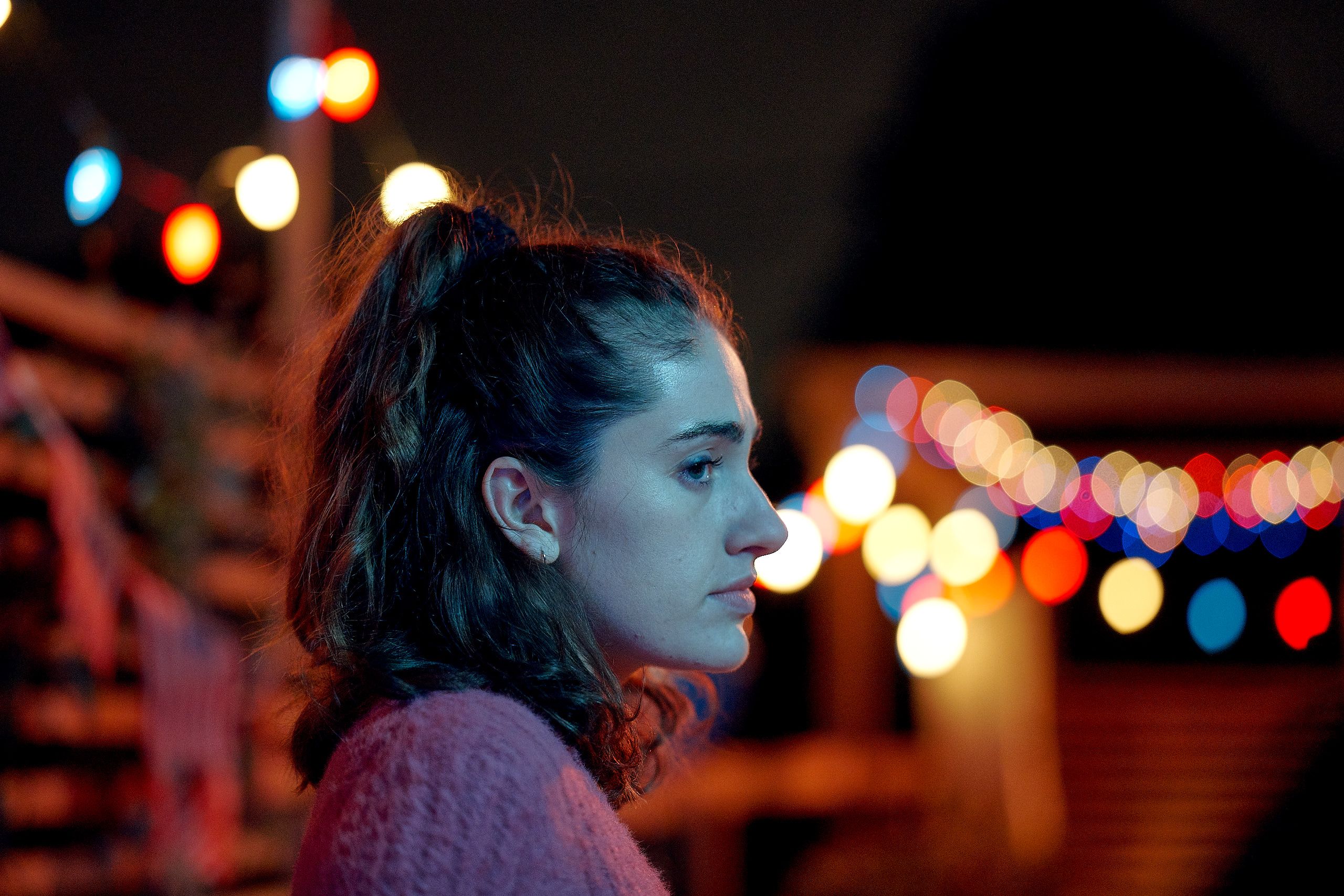
Rachel Sennott as Sam feeling lonely at a party.
MC: Ally, you worked with many women across the production, from the assistant directors to the cinematographer to the production designers. Is it important to you in general to create sets that amplify women in the industry?
AP: I always want to be working with diverse crews and casts, but I don't ever set out to be like, “My sets have to be predominantly female.” Those just tend to be the people I like to collaborate with the most, I feel connected to creatively, and aligned with. It's definitely something that I'm aware that I do—but it's important for people to do because the statistics in our industry are so abysmal. It just felt like these women were all the right fit for this film, and they were the ones who got it.
It should be that natural, right? It shouldn't be to check a box. You want that to reflect the world around you. There's not just a bunch of straight white men in cargo shorts—David, Kyle, and Tim. It's a bit broader than that. I want my sets and projects to reflect my friends, my community, and the people I love in my life, and I think everyone should try to do that a little bit more.
MC: Rachel, you have worked with a handful of women filmmakers—Ally, your frequent collaborator Emma Seligman, Halina Reijn, and others. Is that something you set out to do or do you feel drawn to their material?
RS: I feel so lucky to work with everyone I've worked with. I think it’s the material that I've been drawn to. For me, too, I love working with my friends because they are also cool and talented and creators. Like, Ayo [Edebiri] and Molly [Gordon] are both directors, too. I would love to be directed by them someday. When you find your people you love working with, you keep trying to find more things to do with them.
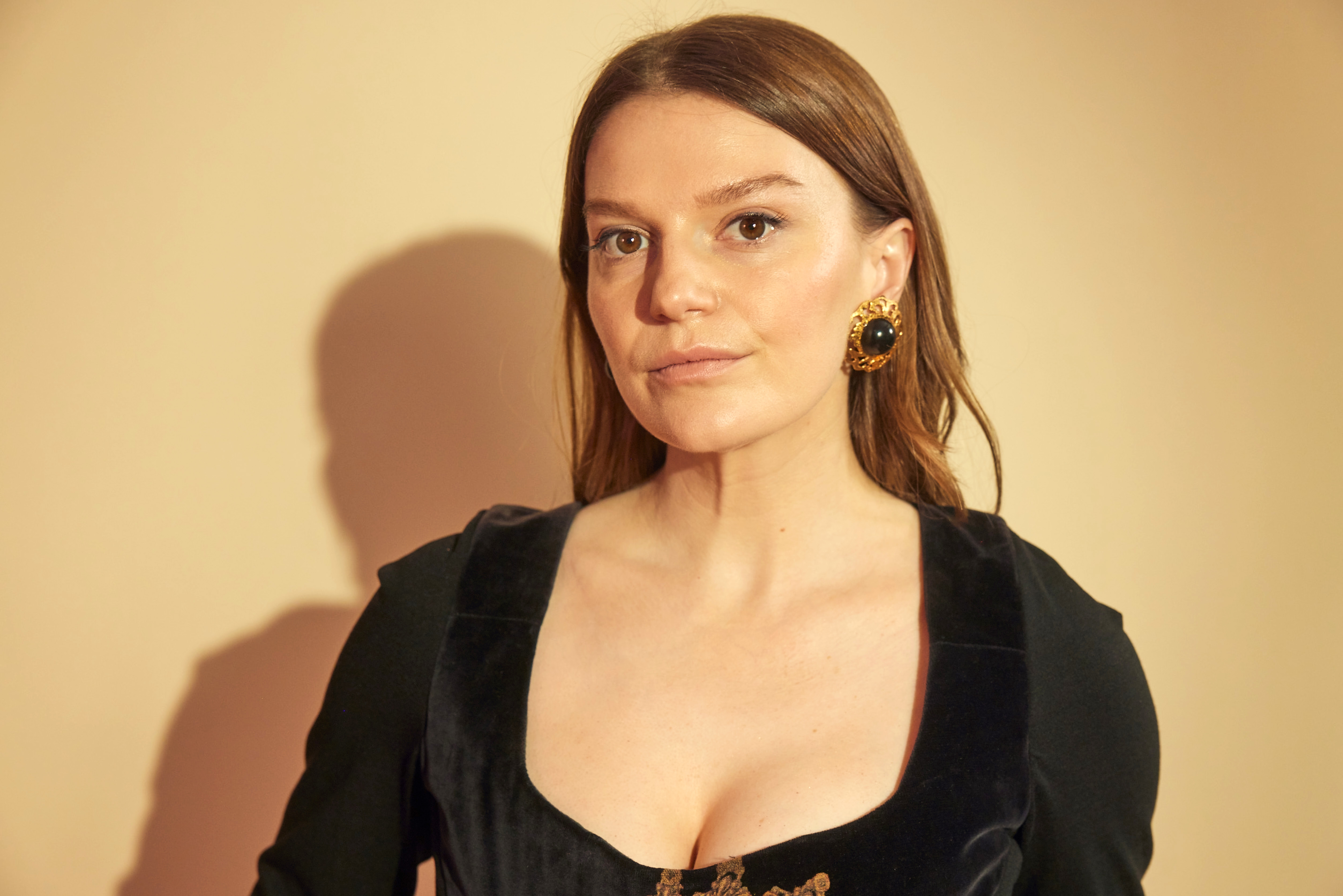
Ally Pankiw at the IMDb Portrait Studio at SXSW 2023 in March 2023 in Austin, Texas.
MC: Ally, you have a mentorship program where you work with women and queer filmmakers of color on your projects. What was the genesis for that and why was that initiative important to you?
AP: It's a very isolating industry as a female filmmaker and definitely was when I started my career, 10-15 years ago. We always see the depressing pie chart of the statistics of female directors—it’s always somewhere between 7 and 11 percent of directors are women, and then the rest of the pie chart is dudes. They haven't done anything to change that pie chart for a century. I am embarrassed by what the pie chart of our industry looks like. So I want to try and do something to change it.
Then for me as a white female filmmaker, those statistics are bad, but they're even worse, obviously, for female directors of color. So I was like, “Okay, well, that's where I can at least send the elevator down with my white privilege,” so I bring a young female filmmaker of color onto all my sets as a paid shadowing director. I started doing it because it felt like something active I could do, and it’s grown organically. Now I'm working with a few organizations to formalize the initiative and expand it and start working to encourage other female filmmakers to do the same thing.
There are so many young women out there who need access to some of these spaces in our industry, the confidence to have bigger sets demystified, and show them that like, ‘Yeah, no one knows what they're doing. You can do this too.’ It started as a way to be more involved in my film community because I didn't go to film school and wanted to find that community too. At this point, I've met so many friends through doing this. It's been a nice way to meet other cool female directors and build community with them. So it's also been fun and joyful and easy—and I would like to encourage other people in that pie chart who are lucky enough to be some of the working directors in the pie chart to consider bringing on mentees as well.
This interview has been edited and condensed for clarity.
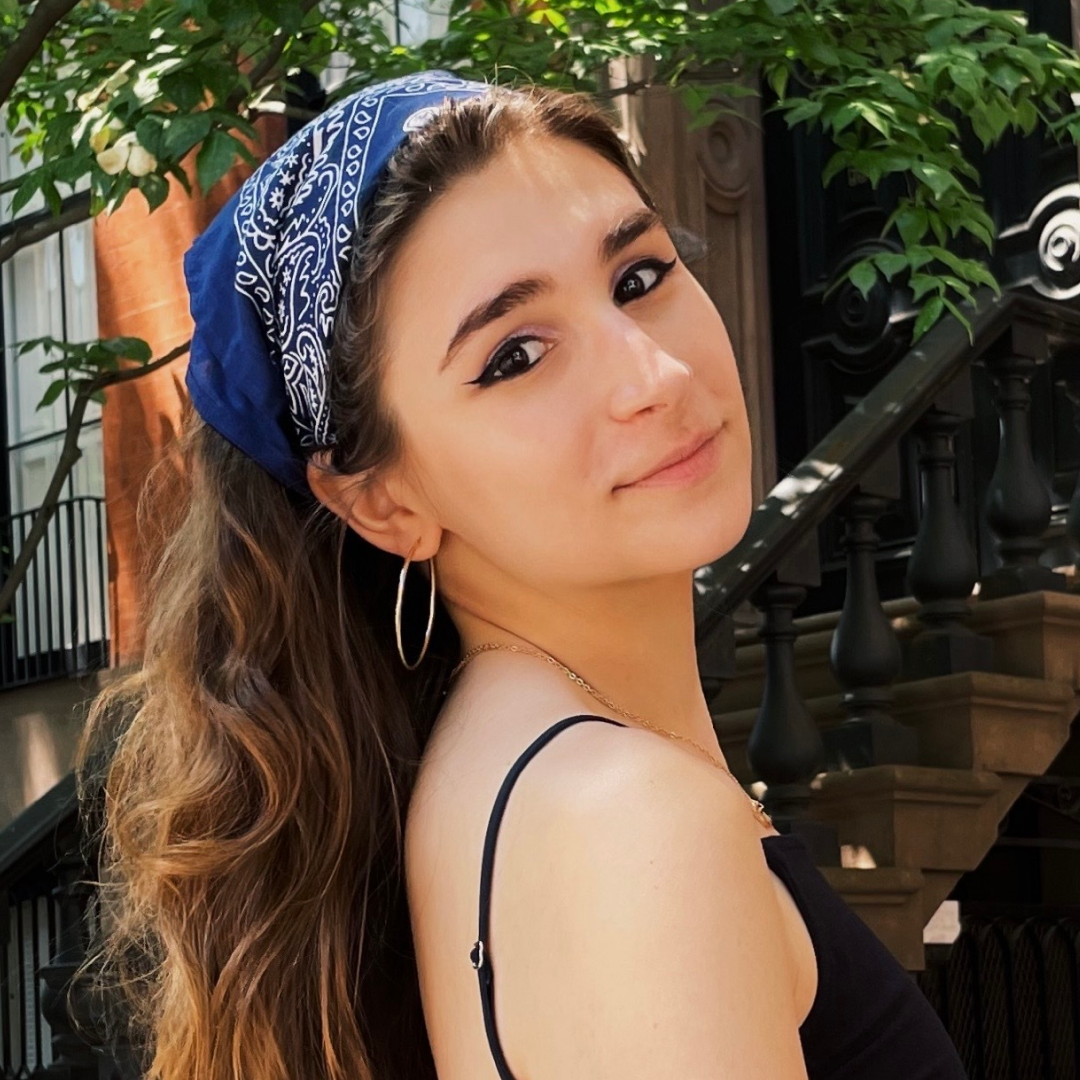
Sadie Bell is the Senior Culture Editor at Marie Claire, where she edits, writes, and helps to ideate stories across movies, TV, books, music, and theater, from interviews with talent to pop culture features and trend stories. She has a passion for uplifting rising stars, and a special interest in cult-classic movies, emerging arts scenes, and music. She has over nine years of experience covering pop culture and her byline has appeared in Billboard, Interview Magazine, NYLON, PEOPLE, Rolling Stone, Thrillist and other outlets.